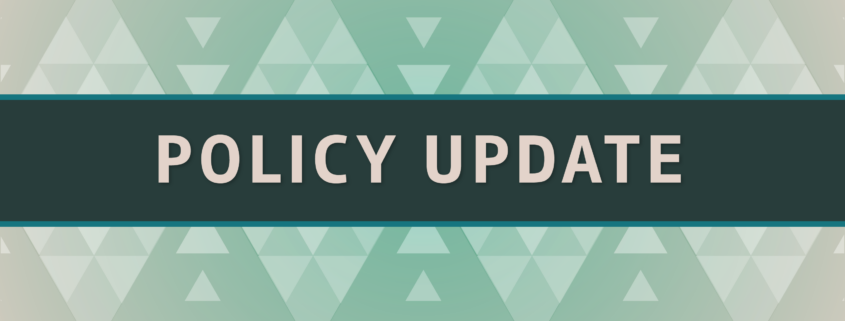July Policy Updates: Traditional Food Report, Supreme Court Rulings, and FY 2025 Budget Boosts
In this Edition:
🍲🌾 Traditional Food Report: NCUIH publishes an in-depth report on Traditional Food programs at Urban Indian Organizations.
⚖ Supreme Court Updates: Key rulings and their impact on Urban Indian Organizations.
📊 FY 2025 Budget Boosts: Significant increases for Indian Country programs in the new spending bills.
🎤 NCUIH in Action: Highlights from CMS Tribal Technical Advisory Committee meetings.
💉📞 Advocacy for Vaccines & Telehealth: Supporting access to vaccines and audio-only telehealth services.
🧠👨👩👧👦 Behavioral Health Funding: NCUIH’s push for noncompetitive funding and whole family treatment support.
📅 Important Dates: Mark your calendars for August’s meetings, conferences, and deadlines for federal comments.
🔍 Setting Policy Priorities: Join NCUIH’s UIO focus groups in September to shape 2025 policy priorities.
💡 Funding Opportunity: SAMHSA Women’s Behavioral Health Technical Assistance Center applications due soon!
Appropriations Updates: FY 2025 Spending Bills Include Increases for Indian Country Programs
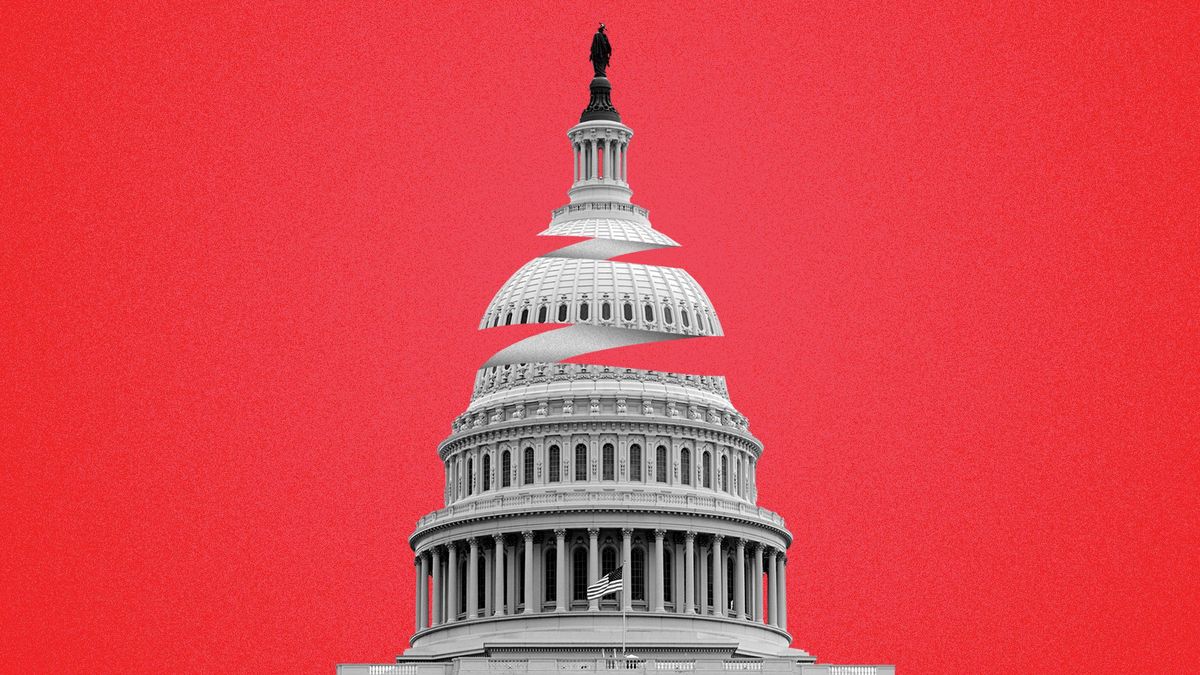
House and Senate FY 2025 Interior Bills:
On July 25, the House of Representatives passed their bill, by a vote of 210-205, with a 23% increase for the Indian Health Service (IHS) at $8.56 billion, and $99.99 million for Urban Indian health, which is $9.5 million above FY 2024 enacted levels. On July 25, the Senate Appropriations Committee passed their bill, by a vote of 28-1, with a 22% increase for IHS at $8.5 billion, and $94.57 million for Urban Indian health, which is $4.17 million above FY 2024 enacted levels. Both bills maintained advance appropriations for IHS in FY 2026.
Next Steps: The Senate bill will now advance to the floor for a vote. Should the bill pass the Senate, both House and Senate leadership will work together to negotiate a final bill text for passage in both chambers. FY 2024 funding is set to end on September 30, 2024. If Congress cannot come to a funding agreement by that deadline, they will need to pass a Continuing Resolution to keep the funding levels at the FY24 level until they can reach an agreement. Should political disagreements lead to a government shutdown, UIOs and parts of IHS will be protected by Advance Appropriations.
Go deeper: For a more detailed analysis of Indian Country provisions, read our House blog and Senate blog.
House Passes Labor-HHS Appropriations Bill:
On July 10, 2024, the House Appropriations Full Committee passed a FY 2025 Labor, Health, and Human Services (LHHS) appropriations bill with increases for Indian Country Programs.
By the numbers:
- Improving Native American Cancer Outcomes Program – $15 million (+9 million from FY 2024)
- Good Health and Wellness in Indian Country – $30 million (+6 million from FY 2024)
- Minority HIV/AIDS Prevention and Treatment Program: $45 million (-15 million from FY 2024) and $6 million Tribal set-aside
- Tribes and Tribal Organizations for Medication-Assisted Treatment for Prescription Drug and Opioid Addiction – (+$16.5 million from FY 2024)
Go deeper: Read NCUIH’s analysis of the bill.
Next Steps: Facing challenges to passing their other appropriations bills, House Republican Leadership have cancelled votes and will be headed into recess a week earlier than planned. There currently is no planned schedule for votes on the House LHHS appropriations bill. However, the Senate will be holding a full committee markup on their LHHS bill on August 1.
NCUIH in Action: CMS Tribal Technical Advisory Group Meeting
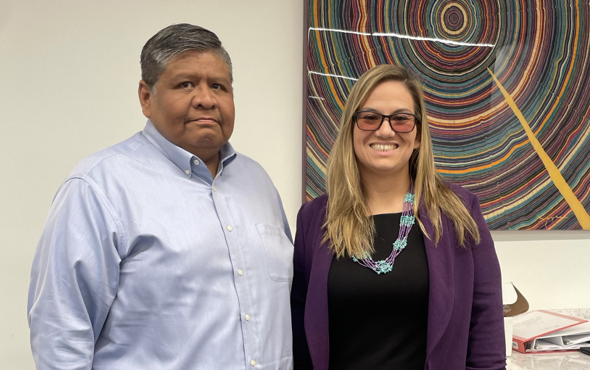
NCUIH Board President, Walter Murillo (Choctaw) and NCUIH CEO, Francys Crevier (Algonquin) together at the Medicare, Medicaid and Health Reform Policy Committee meeting.
On July 16, NCUIH represented UIOs on the Medicare, Medicaid and Health Reform Policy Committee (MMPC), a standing committee of the National Indian Health Board (NIHB), ahead of the Centers for Medicare and Medicaid Services (CMS) Tribal Technical Advisory Group (TTAG) Face-to-Face Meeting. The primary purpose of MMPC is to provide technical support to TTAG.
On July 17-18, NCUIH served as Technical Advisors at the CMS TTAG Face-to-Face Meeting with NCUIH President, Walter Murillo (Choctaw), and NCUIH Board Member, Todd Wilson (Crow) who serve as the NCUIH representatives on the advisory group.
Go Deeper: Mr. Murillo spoke on the issue of Medicaid fraud in Arizona impacting Native people and urged CMS to take action.
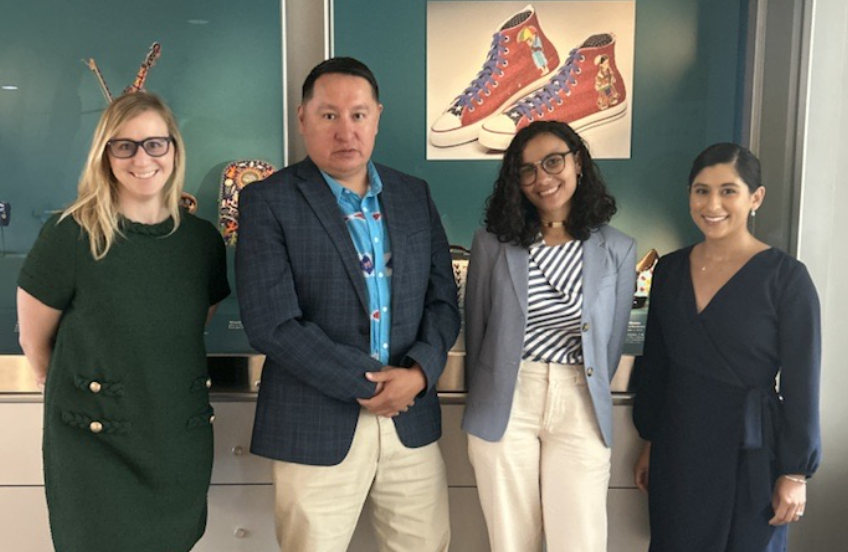
NCUIH VP of Policy and Communications, Meredith Raimondi, NCUIH Board Member, Todd Wilson (Crow), NCUIH Research Associate, Nahla Holland (Eastern Pequot Tribal Nation), NCUIH Federal Relations Manager, Alexandra Payan, JD, at CMS TTAG.

NCUIH Research Associate, Nahla Holland (Eastern Pequot Tribal Nation) and NCUIH Federal Relations Manager, Alexandra Payan, JD presenting at CMS TTAG.
NCUIH also presented its reports on Traditional Food at UIOs and Medicaid Reimbursement During COVID-19 at UIOs to the CMS TTAG.
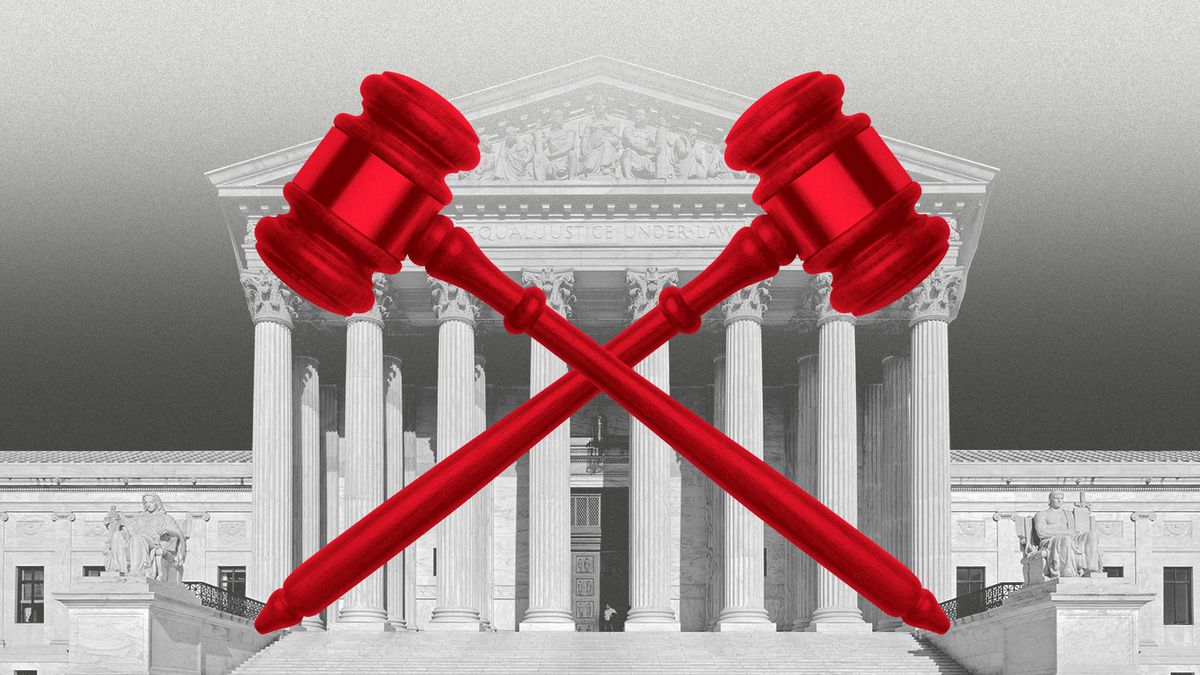
Becerra v. San Carlos Apache (consolidated with Becerra v. Northern Arapaho Tribe)
- What has happened since the June 6 Supreme Court ruling in favor of Tribes?
- In the FY 2025 Interior Appropriations Bill Passed by the House Committee on July 9, Chairman Cole and Republican leadership shifted money from the Labor-HHS-Education bill to the Interior-Environment bill to accommodate the increases required by the result of the Supreme Court decision on contract support costs (CSCs).
- The bill provided an estimated indefinite appropriation of $2.036 billion for CSCs, a $985 million increase above Fiscal Year (FY) 2024 levels.
- What’s Next: NCUIH is closely monitoring budget conversations and advocacy on transferring CSCs to mandatory spending.
- Resource: NCUIH created an FAQ to address any questions or concerns.
Loper Bright Enterprises v. Raimondo
On June 28, the Supreme Court issued a 6-2 ruling. Read more on NCUIH’s blog.
- The bottom line: The Court held that the Administrative Procedure Act requires courts to exercise their independent judgment in deciding whether an agency has acted within its statutory authority, and courts may not defer to an agency interpretation of the law simply because a statute is ambiguous. Chevron v. Natural Resources Defense Council is overruled.
- Relation to UIOs: Now that agency interpretation is not required deference by courts, it could change how federal agencies operate. The decision puts federal executive agency regulations and policy determinations at risk of legal challenge.
- What they are saying: On July 11, Senate Republicans sent a letter to HHS Secretary Becerra, requesting information on how he expects to account for the Loper decision, and how he has prepared for it.
Corner Post, Inc. v. Board of Governors of the Federal Reserve System
On July 1, the Supreme Court issued a 6-3 ruling.
- The bottom line: An Administrative Procedures Act claim does not accrue for purposes of 28 U.S.C. § 2401(a) — the default 6-year statute of limitations applicable to suits against the United States — until the plaintiff is injured by final agency action.
- Relation to UIOs: No direct relation but now allows for challenges to agency action to be brought based on when a party is injured by the action, rather than when the final agency action occurred. This ruling, along with Loper Bright, increases the chance of legal challenge to federal agency regulation or policies and could create a backlog in the courts of challenges to agency action.
Grants Pass v. Johnson
On June 28, the Supreme Court issued a 6-3 ruling.
- The bottom line: The enforcement of generally applicable laws regulating camping on public property does not constitute “cruel and unusual punishment” prohibited by the Eighth Amendment.”
- Relation to UIOs: There is a high population of urban American Indian and Alaska Native people that are homeless. The decision could result in arrests or fines for many of them if similar laws are passed in other cities or states.
United States v. Rahimi
On June 21, the Supreme Court issued an 8-1 ruling.
- The bottom line: When an individual has been found by a court to pose a credible threat to the physical safety of another, that individual may be temporarily disarmed consistent with the Second Amendment.”
- Relation to UIOs: Related to domestic violence and MMIP, the ruling ensures that domestic violence restraining orders that restrict firearm possession are enforceable.
Advocacy Highlights: Support for Vaccine Access, Audio-Only Telehealth Services, and 100% FMAP for UIOs
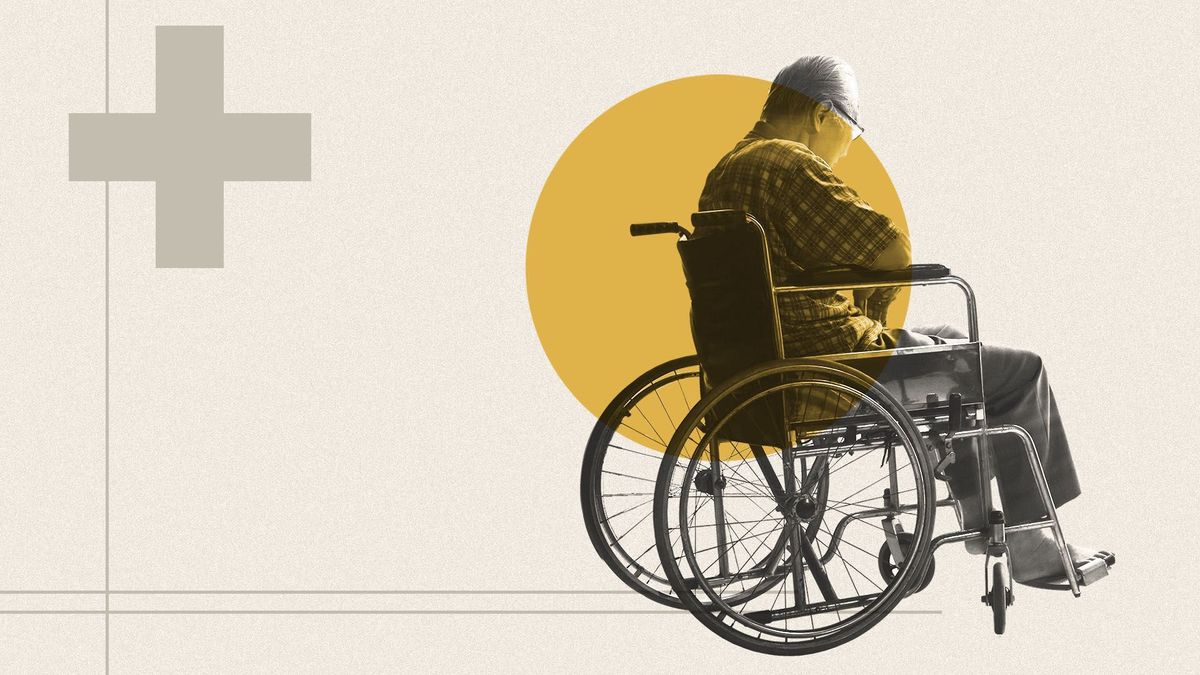
NCUIH has endorsed Senator Brian Schatz’s (D-HI) bill, Protecting Communities Through Vaccination Act, which would create a much-needed safety net by establishing a complementary vaccine program to Vaccines for Children to provide a mechanism for uninsured adults to have access to recommended vaccines and protection from a range of vaccine-preventable-conditions.
- Why it matters: It would create a mechanism for UIOs and Native Hawaiian Healthcare Organizations to directly request vaccines from States.
NCUIH has endorsed Rep. Teresa Leger Fernandez’s (D-NM-3) IHS Audio-Only Telehealth Bill, which would allow for audio-only telehealth for IHS tribal health programs and tribally operated facilities to support beneficiaries in areas with low broadband access and for individuals without camera technology.
- Why it matters: IHS and tribally operated facilities, and UIOs would benefit from continued reimbursement from Medicare for audio-only telehealth services as program budgets heavily depend upon third party reimbursements.
Recent update on FMAP: NCUIH is working to secure additional Republican Cosponsors to the bipartisan Urban Indian Health Parity Act bill.
NCUIH Advocates for Noncompetitive Behavioral Health Funding and Support for Whole Family Treatment and Youth in Recommendations to IHS
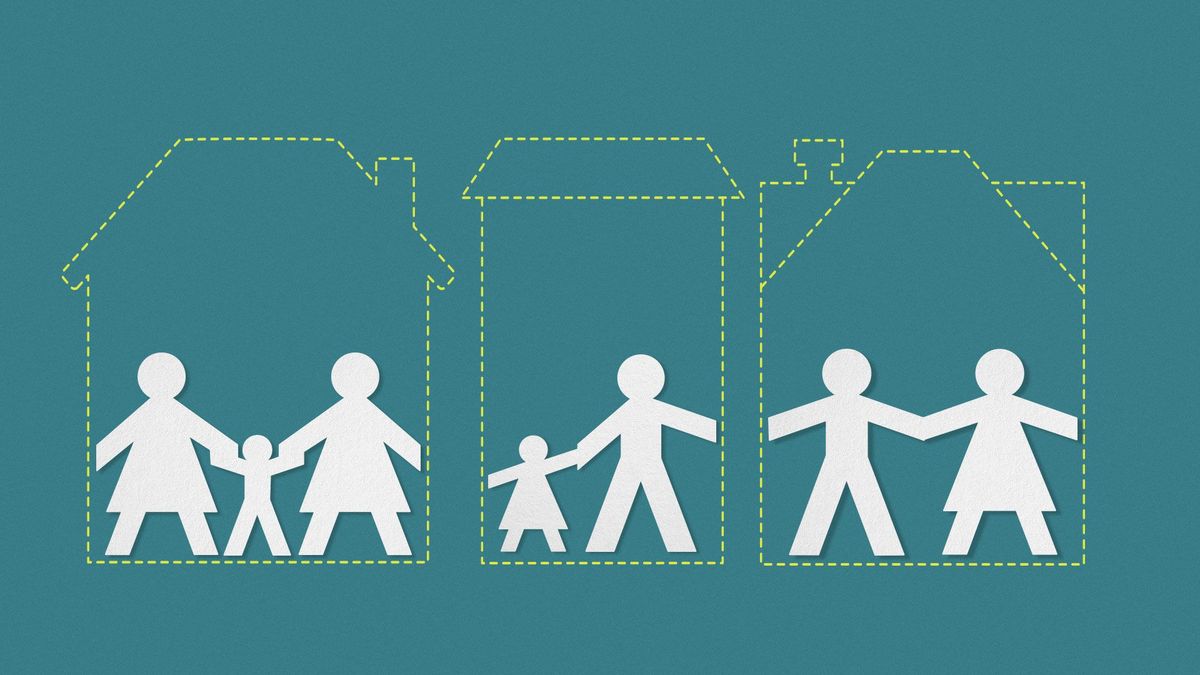
On July 22, NCUIH submitted comments to IHS regarding the Division of Behavioral Health (DBH) Funding Initiatives.
Background: IHS held an urban confer on June 20, 2024.
- In FY 2024, the IHS administered more than $59 million in funding for behavioral health initiatives.
Did You Know?: DBH is evaluating Agency-wide processes for distributing appropriated funding for 7 behavioral health initiatives: Substance Abuse Prevention, Treatment and Aftercare (SASP); Suicide Prevention, Intervention and Postvention (SPIP); Domestic Violence Prevention; Forensic Healthcare Services; Behavioral Health Integration Initiative (BH2I); Zero Suicide Initiative (ZSI); and Youth Regional Treatment Centers Aftercare (YRTC).
Go deeper: NCUIH recommended that IHS ensure noncompetitive program awards across the IHS/Tribal/UIO system, support whole family treatment, support youth residential treatment centers at UIOs, ensure funding reform for these programs does not create additional reporting requirements, and continue to engage with UIOs.
Upcoming Federal Comment Opportunities: Key Dates for Federal Funding Reform and Health Outbreak Responses
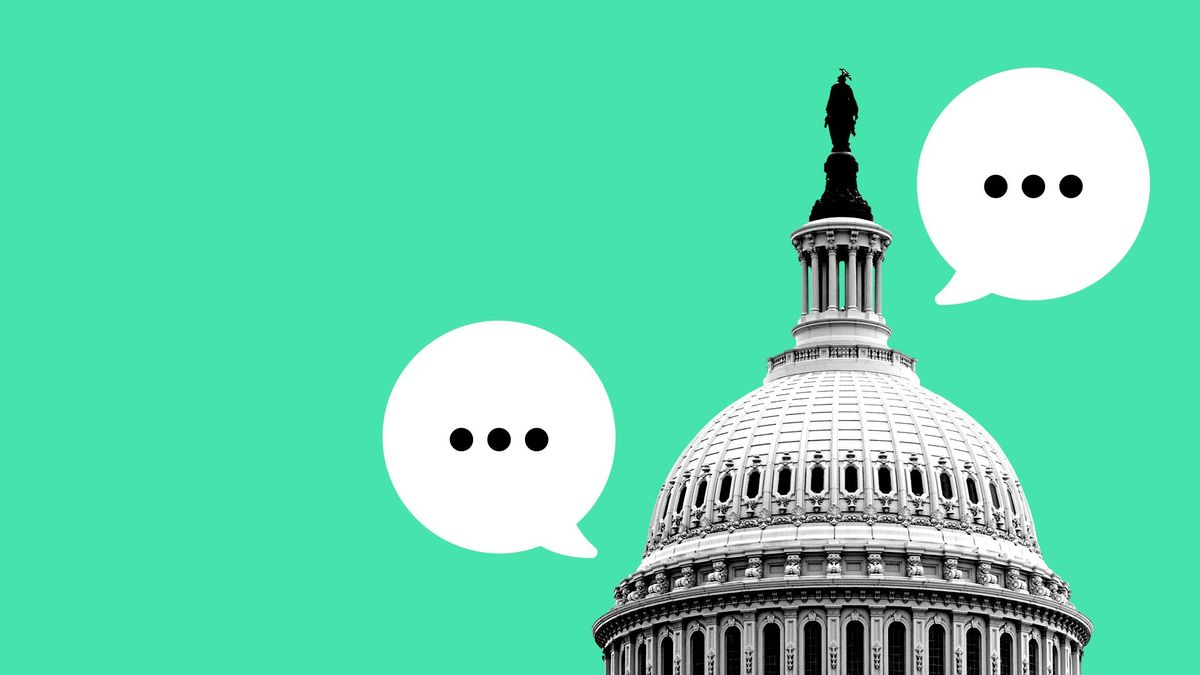
August 9 – White House Domestic Policy Council, the White House Office of Management and Budget, and the White House Council on Native American Affairs (WHCNAA) Tribal Consultation on Executive Order 14112 on Reforming Federal Funding and Support for Tribal Nations to Better Embrace Our Trust Responsibilities and Promote the Next Era of Tribal Self-Determination.
- WHCNAA hosted a Tribal Consultation on July 8, 2024
- What’s next: Deadline for written comments is August 9, 2024, and can be submitted via email to whcnaa@bia.gov
September 5– HHS Office of the Assistant Secretary for Health (OASH) on Syphilis and Congenital Syphilis Outbreak
- OASH will hold Tribal Consultation on August 5, 2024, from 1pm-2:30pm ET to discuss the syphilis and congenital syphilis outbreak impacting Indian country. Register here.
- What’s next: Deadline for written comments is September 5, 2024, and can be submitted to STI@hhs.gov, using the following subject line: “Tribal Consultation.”
October 1 – United States Department of Agriculture (USDA) Dietary Guidelines for America
- USDA is seeking public comment as the 2025 Dietary Guidelines Advisory Committee conducts its scientific review process. Learn more here.
- What’s next: Written comments are due October 1, 2024, and can be submitted online (preferred method) at the Federal eRulemaking Portal, or by mail to Janet M. de Jesus, MS, RD, HHS/OASH Office of Disease Prevention and Health Promotion (ODPHP), 1101 Wootton Parkway, Suite 420, Rockville, MD 20852. All submissions received must include the agency name and Docket OASH-2022-0021.
NCUIH Releases Comprehensive Report on Traditional Foods at Urban Indian Organizations

NCUIH’s report “Thematic Analysis of Traditional Food Programs at Urban Indian Organizations and Research on Traditional Healing” includes interviews that NCUIH conducted with 7 UIOs about their Traditional Food programs and their ability or inability to bill Medicaid. UIOs expressed the need for additional support and funding to sustain their Traditional Food programming.
- Read the report at www.ncuih.org/traditionalfood.
Upcoming Events

August 7-8: 28th Bi-annual Centers for Disease Control and Prevention (CDC)/Agency for Toxic Substances and Disease Registry (ATSDR) Tribal Advisory Committee Meeting. Register here.
August 8: IHS Tribal Consultation and Urban Confer: HIT Modernization Multi-Tenant Domain Considerations. Register here.
August 13-15: 2024 IHS Partnership Conference and Direct Service Tribes (DST) National Meeting in Phoenix, Arizona. Register here.
August 14-15: Region 4 – HHS Annual Regional Tribal Consultation.
August 15: IHS Office of Urban Indian Health Programs (OUIHP)-Urban Program Executive Directors/Chief Executive Officers Monthly Conference Call.
August 14-16: Special Diabetes Program for Indians (SDPI) 2024 Grantee Conference in Albuquerque, New Mexico. Register here.
August 16: IHS Health IT Modernization Tribal Summit in Phoenix, Arizona. Register here.
August 20-22: Region 6 – HHS Annual Regional Tribal Consultation.
Look out for NCUIH’s 2024 Focus Groups – Setting Policy Priorities for 2025:
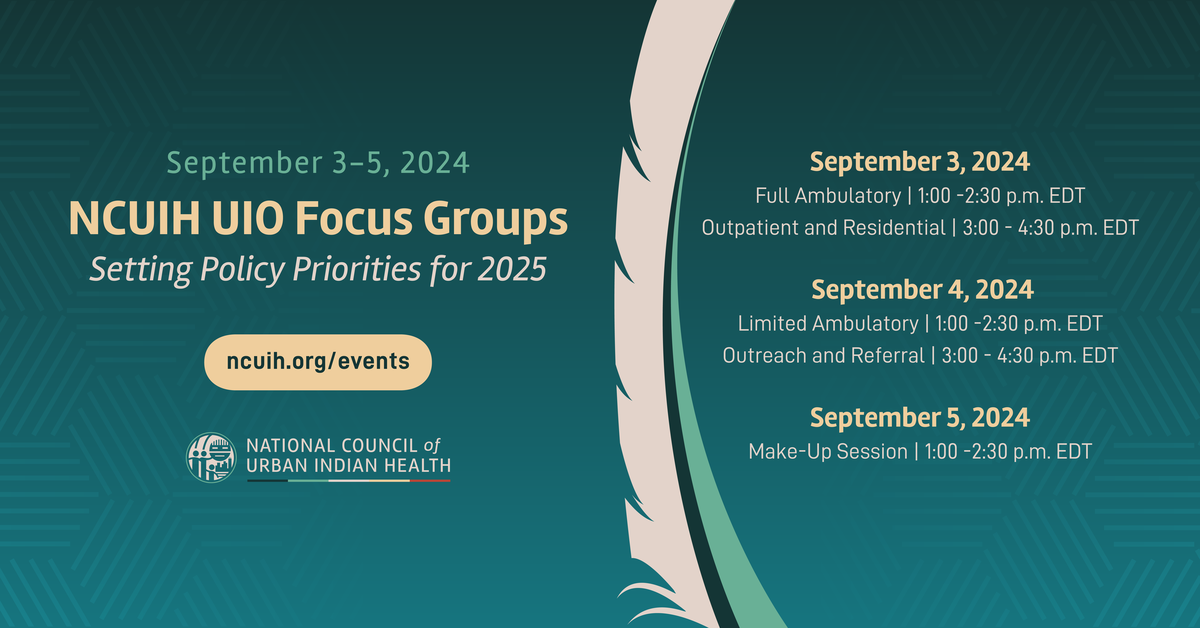
September 3
- 1:00-2:30 p.m. EST – Full Ambulatory
- 3:00-4:30 p.m. EST – Outpatient and Residential
September 4
- 1:00-2:30 p.m. EST – Limited Ambulatory
- 3:00-4:30 p.m. EST – Outreach and Referral
September 5
- 1:00-2:30 p.m. EST – Makeup Session
ICYMI: Federal Letters to Tribal and Urban Leaders

Recent Dear Tribal Leader Letters (DTLLs) and Dear Urban Leader Letters (DULLs):
- Tribal consultation and listening session to be held July 29, 2024, 2-4 PM Eastern.
- The proposed rule amends regulations governing implementation of subchapter IV of the Indian Self-Determination and Education Assistance Act (ISDEAA) and the Department’s Tribal Self-Gov program.
- Next sessions will be Thursday, July 25, 2024, and Thursday, August 15, 2024. Register here by the Monday before your chosen session.
- IHS Division of Health Professions requests assistance in identifying priority health professions for inclusion into categories eligible for the IHS Scholarship Program (SP) in academic year 2025-2026 and the IHS Loan Repayment Program (LRP) in FY2025. Please email your priorities in spreadsheet form by August 1, 2024, to Mr. Jeremy Sheehan at jeremy.sheehan@ihs.gov.
- On July 29, 2024, IHS published a DTLL/DULL inviting Tribal leaders and UIO leaders to attend IHS’ Tribal Summit on Health Information Technology Modernization (Summit). The Summit will take place in person on Friday, August 16, 2024, from 8:30 AM to 12 PM Mountain Standard Time and held in conjunction with the 2024 IHS Partnership Conference. The purpose of the Summit is for Tribal leaders and UIO leaders to participate in face-to-face discussions with IHS leadership regarding the Health Information Technology Modernization Program. The IHS will also share updates with attendees on the Information Technology implementation planning process and enterprise build process. Space will be made available at the Summit for Tribal Leaders and UIO Leaders to caucus. To register, click here.
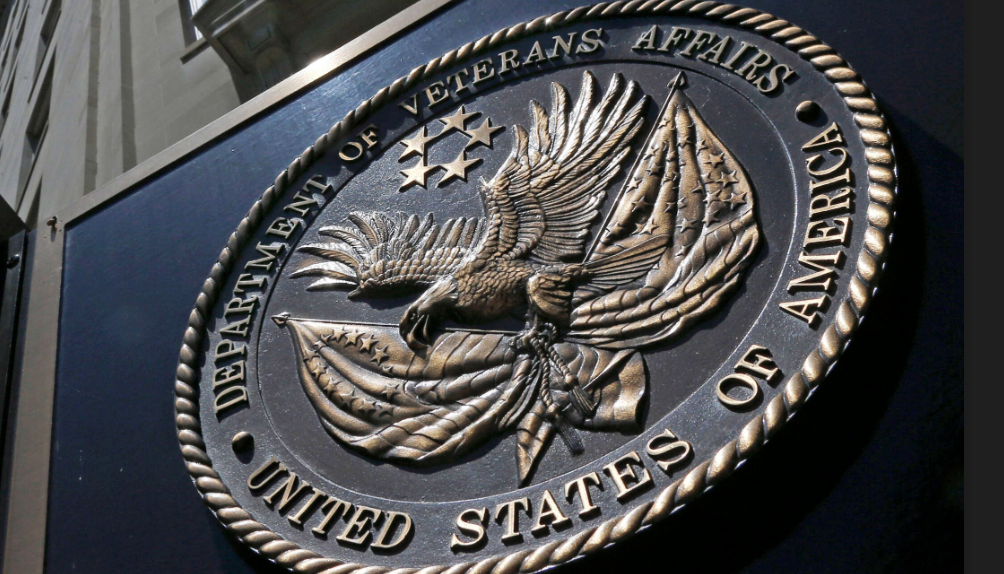
On July 11, 2024, the VA announced implementation of the revised VA-UIO Reimbursement Agreement Program (RAP) template.
- VA hosted an Urban Confer concerning revising the VA-UIO RAP template during NCUIH’s conference. NCUIH submitted comments in response to this Urban Confer on May 15, 2024.
- The agreement continues to explicitly include reimbursement for Durable Medical Equipment (DME), prosthetics/orthotics and supplies, and home health services. Reimbursement for residential treatment continues to not be explicitly excluded.
- Changes in the final RAP template compared to the draft: includes dental services under “Reimbursement Rates for Direct Care Services”; new subsection under “Claim Submission and Payment.”
One last thing, check out these upcoming funding opportunities:
Substance Abuse and Mental Health Services Administration (SAMHSA) Women’s Behavioral Health Technical Assistance Center:
- Application Deadline Date: August 20, 2024 (Apply)

